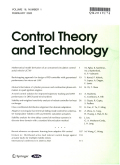- 钛学术文献服务平台 \
- 学术期刊 \
- 工业技术期刊 \
- 自动化技术与计算机技术期刊 \
- 控制理论与技术(英文版)期刊 \
null
New directions in distributed Nash equilibrium seeking based on monotone operator theory
基本信息来源于合作网站,原文需代理用户跳转至来源网站获取
摘要:
There has been an increasing research interest in modeling, optimization and control of various multi-agent networks that have wide applications in industry, defense, security, and social areas, such as computing clusters, interconnected micro-grid systems, unmanned vessel swarms [1], power systems [2], multiple UAV systems [3] and sensor networks [4].For non-cooperative agents that only concern selfish profit-maximizing, the decision making problem can be modelled and solved with the help of game theory, while Nash equilibrium (NE) seeking is at the core to solve the non-cooperative multi-agent games [5-7].Distributed NE seeking methods are appealing compared with the center-based methods in large-scale networks due to its scalability, privacy protection, and adaptability.Recently, monotone operator theory is explored for distributed NE seeking, which is shown to provide an uniform framework for various algorithms in different scenarios.It has been gradually developing into a cutting-edge research field, with the prospect and necessity of future in-depth research.

推荐文章
期刊_丙丁烷TDLAS测量系统的吸收峰自动检测
带间级联激光器
调谐半导体激光吸收光谱
雾剂检漏 中红外吸收峰 洛伦兹光谱线型
不同盐度、温度及光照对漂浮浒苔生理生态的影响
浒苔
盐度
温度
光照
生理生态
期刊_联合空间信息的改进低秩稀疏矩阵分解的高光谱异常目标检测
高光谱图像
异常目标检测 低秩稀疏矩阵分解 稀疏矩阵 残差矩阵
内容分析
关键词云
关键词热度
相关文献总数
(/次)
(/年)
文献信息
| 篇名 | New directions in distributed Nash equilibrium seeking based on monotone operator theory | ||
| 来源期刊 | 控制理论与技术(英文版) | 学科 | |
| 关键词 | |||
| 年,卷(期) | 2020,(3) | 所属期刊栏目 | |
| 研究方向 | 页码范围 | 333-335 | |
| 页数 | 3页 | 分类号 | |
| 字数 | 语种 | 英文 | |
| DOI | 10.1007/s11768-020-0109-z | ||
五维指标
引文网络
引文网络
二级参考文献 (97)
共引文献 (2)
参考文献 (11)
节点文献
引证文献 (0)
同被引文献 (0)
二级引证文献 (0)
1950(2)
- 参考文献(0)
- 二级参考文献(2)
1951(1)
- 参考文献(0)
- 二级参考文献(1)
1953(1)
- 参考文献(0)
- 二级参考文献(1)
1966(1)
- 参考文献(0)
- 二级参考文献(1)
1969(1)
- 参考文献(0)
- 二级参考文献(1)
1973(3)
- 参考文献(0)
- 二级参考文献(3)
1976(1)
- 参考文献(0)
- 二级参考文献(1)
1978(1)
- 参考文献(0)
- 二级参考文献(1)
1979(1)
- 参考文献(0)
- 二级参考文献(1)
1984(1)
- 参考文献(0)
- 二级参考文献(1)
1995(2)
- 参考文献(0)
- 二级参考文献(2)
1996(1)
- 参考文献(0)
- 二级参考文献(1)
1999(1)
- 参考文献(0)
- 二级参考文献(1)
2000(3)
- 参考文献(0)
- 二级参考文献(3)
2001(2)
- 参考文献(0)
- 二级参考文献(2)
2002(2)
- 参考文献(0)
- 二级参考文献(2)
2003(1)
- 参考文献(0)
- 二级参考文献(1)
2006(2)
- 参考文献(0)
- 二级参考文献(2)
2007(6)
- 参考文献(0)
- 二级参考文献(6)
2008(2)
- 参考文献(0)
- 二级参考文献(2)
2009(6)
- 参考文献(1)
- 二级参考文献(5)
2010(5)
- 参考文献(1)
- 二级参考文献(4)
2011(8)
- 参考文献(0)
- 二级参考文献(8)
2012(4)
- 参考文献(0)
- 二级参考文献(4)
2013(11)
- 参考文献(0)
- 二级参考文献(11)
2014(7)
- 参考文献(0)
- 二级参考文献(7)
2015(14)
- 参考文献(1)
- 二级参考文献(13)
2016(11)
- 参考文献(2)
- 二级参考文献(9)
2017(3)
- 参考文献(2)
- 二级参考文献(1)
2018(1)
- 参考文献(1)
- 二级参考文献(0)
2019(3)
- 参考文献(3)
- 二级参考文献(0)
2020(0)
- 参考文献(0)
- 二级参考文献(0)
- 引证文献(0)
- 二级引证文献(0)
引文网络交叉学科
相关学者/机构
期刊影响力
控制理论与技术(英文版)
主办单位:
华南理工大学
出版周期:
季刊
ISSN:
2095-6983
CN:
44-1706/TP
开本:
16开
出版地:
广州市五山华南理工大学内
邮发代号:
创刊时间:
2003
语种:
eng
出版文献量(篇)
1113
总下载数(次)
0
总被引数(次)
4188
期刊文献
相关文献
推荐文献
- 期刊分类
- 期刊(年)
- 期刊(期)
- 期刊推荐
一般工业技术
交通运输
军事科技
冶金工业
动力工程
化学工业
原子能技术
大学学报
建筑科学
无线电电子学与电信技术
机械与仪表工业
水利工程
环境科学与安全科学
电工技术
石油与天然气工业
矿业工程
自动化技术与计算机技术
航空航天
轻工业与手工业
金属学与金属工艺
控制理论与技术(英文版)2022
控制理论与技术(英文版)2021
控制理论与技术(英文版)2020
控制理论与技术(英文版)2019
控制理论与技术(英文版)2018
控制理论与技术(英文版)2017
控制理论与技术(英文版)2016
控制理论与技术(英文版)2015
控制理论与技术(英文版)2014
控制理论与技术(英文版)2013
控制理论与技术(英文版)2012
控制理论与技术(英文版)2011
控制理论与技术(英文版)2010
控制理论与技术(英文版)2009
控制理论与技术(英文版)2008
控制理论与技术(英文版)2007
控制理论与技术(英文版)2006
控制理论与技术(英文版)2005
控制理论与技术(英文版)2004
控制理论与技术(英文版)2003

 免费查重
免费查重










